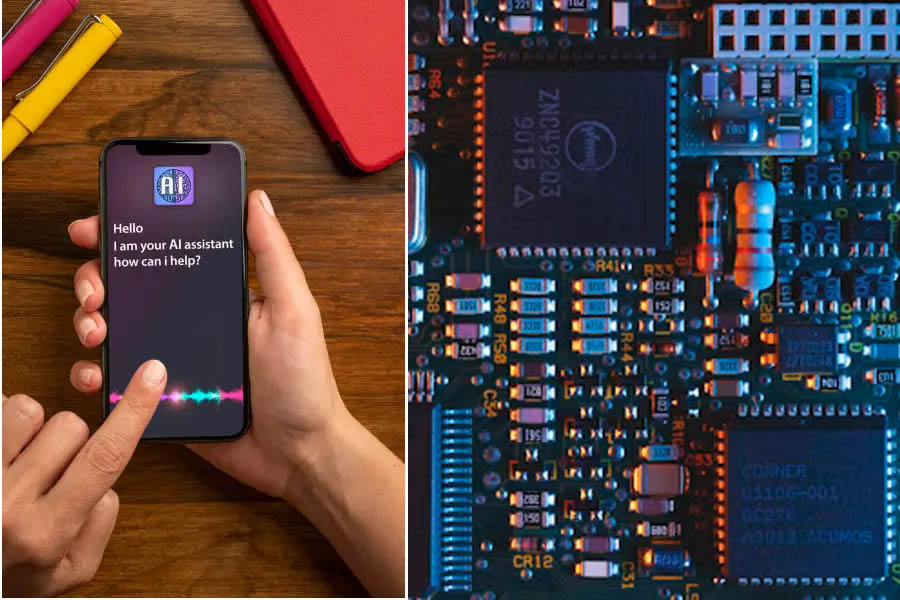
Artificial Intelligence (AI) is the new frontier for tech giants and investors alike, with hundreds of billions of dollars pouring into the sector, aiming to revolutionize industries and reshape the global economy. The rush to capitalize on generative AI is marked by a boom not seen since the rise of the internet or smartphones. Yet, amid all this excitement, one lingering question remains: Will these investments ever truly pay off?
The Edge vs. Cloud Conundrum
Leading the charge is Apple, which recently unveiled its latest iPhone 16 series at a glitzy event dubbed "It’s Glowtime". The tech giant hyped up its AI-powered “Apple Intelligence” during the event, though consumers and investors were left questioning when these promised innovations would actually materialize
While the new iPhones boast the superfast A18 chip designed to support on-device AI processing, most features won’t be ready until at least October, and many will remain in beta form for now. The immediate returns on Apple's AI investment, especially in terms of boosting flagging iPhone sales, remain uncertain. CEO Tim Cook’s promises of future AI breakthroughs come at a time when the company needs a win, but many wonder if the tech is ready for prime time.
Shifting AI from cloud-based models, which rely heavily on Nvidia's costly and energy-hungry GPUs, to smaller edge devices like smartphones has been an aspiration of tech firms for years. Companies like Apple, Samsung, and Microsoft are in a race to lead this shift. However, doing so efficiently while ensuring these devices don’t drain their batteries or overheat remains a significant challenge.
The Business AI Angle
Apple isn’t alone in its AI push. As enterprises become increasingly interested in AI’s potential to automate tasks and increase productivity, they’re cautious about its security implications. This is especially true when dealing with sensitive corporate data.
CIOs of major companies, including Rocket Cos. and Walmart, are excited about AI’s possibilities but remain wary of how Apple’s AI system will handle private data. Apple claims it offers stringent privacy protections, with on-device processing for most AI tasks, but more complex queries will require cloud-based processing. While Apple promises transparency and user control over data processing, privacy concerns remain a hurdle to mass adoption.
Interestingly, Apple’s partnership with OpenAI raises further questions about data privacy. For example, users may need to consent before their data is sent to OpenAI’s servers for more advanced text generation tasks. This creates a dual system where users are relying on both Apple’s AI and external partners, potentially muddying the waters when it comes to privacy.
The Global AI Race
While Apple is betting on AI to drive future sales, the company is hardly alone in the race to leverage this revolutionary technology. Nvidia, Microsoft, and Samsung are also investing heavily in AI, with each company tackling the challenge from different angles. Nvidia has become synonymous with AI in data centers, thanks to its dominant position in GPU production, but as edge AI emerges, other players are hoping to get a piece of the pie.
Edge AI could allow devices to function more autonomously, reducing their reliance on cloud computing, but it’s still in its infancy. Qualcomm and startups like Mythic are working to produce energy-efficient chips that will make AI processing feasible on smaller devices. These chips, designed to maximize performance per watt, are critical to overcoming the current limitations in AI processing at the edge.
AI and the Corporate World: Adoption, Caution, and Skepticism
Beyond consumer devices, enterprises are keenly watching AI’s development, hoping it can transform how businesses operate. But as Kunal Anand, CTO of F5, and other CIOs have pointed out, many questions remain. The lack of transparency regarding when AI operates on-device versus in the cloud is a sticking point for security-conscious companies. Apple has attempted to address these concerns by offering transparency logs and security controls, but enterprises are still cautious about deploying these tools at scale.
Yet, for businesses that do adopt AI successfully, the rewards could be immense. AI could streamline workflows, enhance customer service, and create new digital advertising opportunities. As Walmart’s COO of Global Technology, Anshu Bhardwaj, noted, enterprises are likely to drive AI adoption on a larger scale once the technology matures and security concerns are resolved.
AI gold rush truly pay off?
For now, the AI boom is both a promise and a puzzle. Tech giants like Apple are positioning themselves to lead the next wave of technological innovation, but the timeline for tangible results remains uncertain. Investors and consumers alike will need patience as AI continues to evolve from a promising experiment to a potentially transformative force across industries.
The question remains: Will this AI gold rush truly pay off, or will it turn out to be another tech mirage? Time, and technology, will tell.
#AIinvestments #artificialintelligencefuture #techgiantsAI #AppleAItechnology #AIrevolution #businessAIadoption #edgecomputingAI
Thank you for reading: globalpostheadline.com





